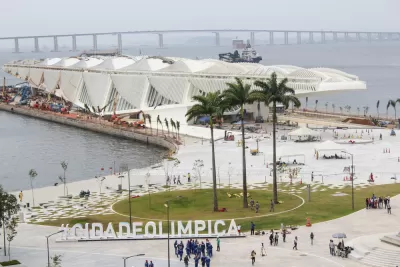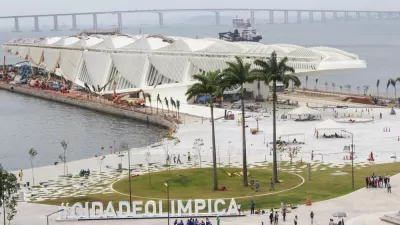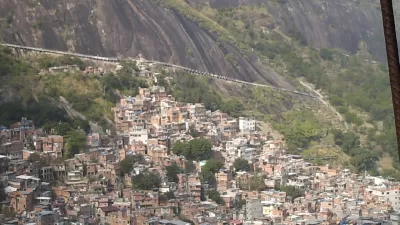A long-read in The Nation pokes large holes in the narrative of the Olympics as a beacon of equality and unity. The effect in Brazil, according to the article, has been quite the opposite.

According to an article by Dave Zirin, "the 2016 Summer Olympics in Rio de Janeiro could have been another chapter in this long history of facades for foreign consumption." Instead, "with a dramatic set of crises breaking out across the country, the multibillion-dollar Olympic mirage…is at risk of complete collapse. "
According to Zirin, it's easy provide a list of what's going wrong in the country—from political corruption to budget shortfalls to the public health risks of the Zika virus. Instead of characterizing the problems as "general chaos" and symptoms of the shortcomings of the developing world, Zirin pins the responsibility for the country's troubles on the International Olympic Committee.
We have seen this corruption in city after city that has hosted the games, particularly since 9/11, as spiraling security costs and out-of-control budgets have become central to the games themselves. The names of recent Olympic host cities—Athens, Beijing, London, Sochi—are more likely to conjure images of heavily armed troops; abandoned, rotted-out Olympic stadiums; and multibillion-dollar price tags than anything that happened on the field of play.
But for this year’s Rio Olympics, the corruption is also a function of how Brazil’s elites have always done business, and the crisis has little to do with general problems in the “developing world.” Instead, it is closely connected to the fact that Brazil is an incredibly unequal society, with oligarchical elites who disdain the poor, mourn for a lost military dictatorship, and don’t particularly care for democracy (all attractive traits to the IOC when looking for an Olympic host city).
Zirin reports from Rio de Janeiro, where he met with Mayor Eduardo Paes, to hear his case for the case for the Olympics as a legacy-building success for the country. Zirin replies to that narrative by describing the displacement that has come as a consequence to the Olympic ambition. He visits residents of the Colônia Juliano Moreira public housing project, finding "the voices of the poorest, least empowered people in the city," who Zirin says have "the power to overturn the $11.9 billion apple cart by exposing as a lie the idea that the Olympics are a social good."
FULL STORY: Budget Failures, Displacement, Zika—Welcome to Rio’s $11.9B Summer Olympics

Planetizen Federal Action Tracker
A weekly monitor of how Trump’s orders and actions are impacting planners and planning in America.

San Francisco's School District Spent $105M To Build Affordable Housing for Teachers — And That's Just the Beginning
SFUSD joins a growing list of school districts using their land holdings to address housing affordability challenges faced by their own employees.

The Tiny, Adorable $7,000 Car Turning Japan Onto EVs
The single seat Mibot charges from a regular plug as quickly as an iPad, and is about half the price of an average EV.

With Protected Lanes, 460% More People Commute by Bike
For those needing more ammo, more data proving what we already knew is here.

In More Metros Than You’d Think, Suburbs are Now More Expensive Than the City
If you're moving to the burbs to save on square footage, data shows you should think again.

The States Losing Rural Delivery Rooms at an Alarming Pace
In some states, as few as 9% of rural hospitals still deliver babies. As a result, rising pre-term births, no adequate pre-term care and "harrowing" close calls are a growing reality.
Urban Design for Planners 1: Software Tools
This six-course series explores essential urban design concepts using open source software and equips planners with the tools they need to participate fully in the urban design process.
Planning for Universal Design
Learn the tools for implementing Universal Design in planning regulations.
Smith Gee Studio
City of Charlotte
City of Camden Redevelopment Agency
City of Astoria
Transportation Research & Education Center (TREC) at Portland State University
US High Speed Rail Association
City of Camden Redevelopment Agency
Municipality of Princeton (NJ)




























